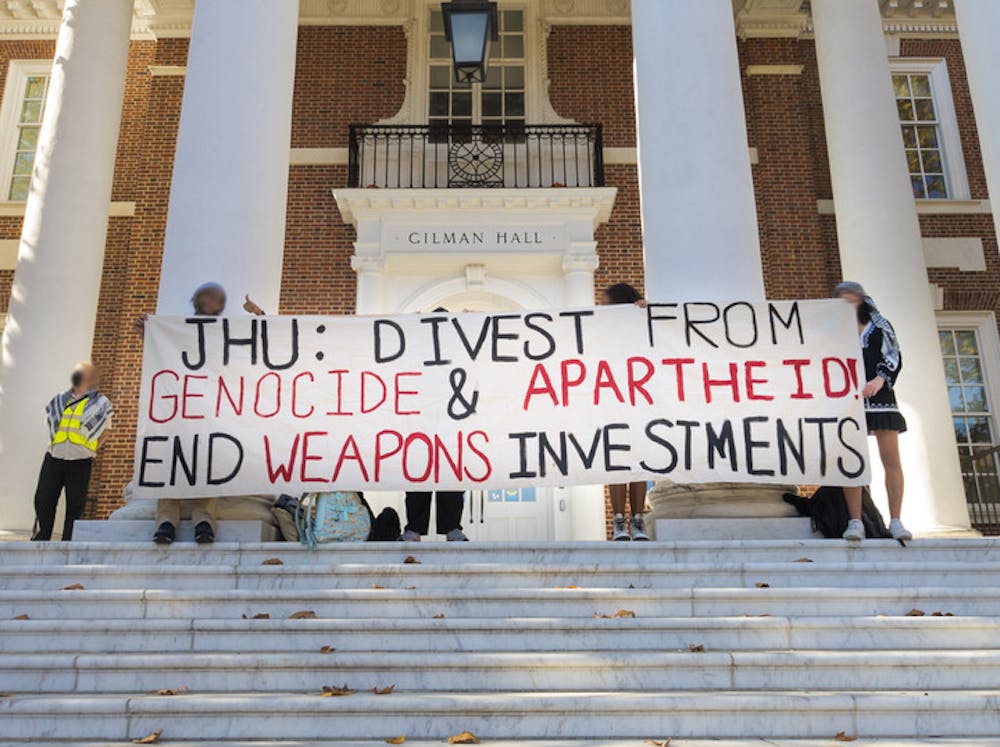Following last week’s vigil, Johns Hopkins University Dissenters and Speak Out Now organized a walkout on Monday, Oct. 30 in solidarity with Palestine. The walkout voiced demands to the University administration and included speeches from Hopkins community members.
Dissenters presented four demands to the University administration. First, they called on the University to divest from weapons manufacturers, like Boeing, Raytheon and Lockheed Martin. Then, they demanded the University to publicly call for an immediate ceasefire, an end to Israel’s siege on Gaza and an end to U.S. military aid to Israel. They also called for the University to publicly condemn Islamophobia and anti-Arab racism, as well as hold individuals accountable for racist actions. Lastly, they asked the University to provide dedicated mental health resources to Palestinians and all groups affected by the ongoing conflict.
In an email to The News-Letter, Kisa, a student leader of the event using a pseudonym, stated that these demands will help students in support of Palestine, some of whom have been targets of death threats and harassment, to feel safer and more supported on campus.
“Demands not being met is not an option,” she wrote. “The last three demands pertain directly to the on-campus environment, and if the campus administration does not address the way Muslim and Arab students have been treated, then they are forsaking their own duty as administrators.”
Speakers at the walkout also commented on the lack of resources and security for Muslim and Arab students. For Kisa, more resources means enhanced security, supportive events for pro-Palestinian students to mourn, contact with the administration and more well-rounded education to the Hopkins community on the conflict.
“People genuinely do not realize how bad the harassment and targeting has gotten on this campus,” she wrote. “Just a day ago, I was walking down the street and people went out of their way to shout at me because I wear a hijab. I have faced multiple incidents of harassment. And nothing has been done when I reported. And it’s not just me. It’s all Muslim and Arab students.”
An attendee at the walkout, Reina, using a pseudonym, expressed her support for the walkout’s demands in an interview with The News-Letter. She was empowered to attend after seeing news of the tragedies occurring in Palestine but expressed skepticism toward getting the University to act.
“I feel like you can protest, but if you don't actually somehow talk to administration and somehow get them to understand some sentiment or compromise and express what they're willing to do, I'm not sure what can be done,” she said.
Besides meeting the four demands, the goals of the the walkout were to educate students on the history of the conflict in Palestine as well as show the pro-Palestinian community members that they were not alone. According to Necha, one of the event organizers using a pseudonym, over 200 people from various backgrounds attended the event. Among the speakers at the event, one faculty member and two Jewish students spoke up in support of Palestine.
David, using a shortened name, was one of the Jewish speakers. He told The News-Letter in an interview that this was the first protest he ever attended.
“It was spontaneous. I was surprised to see a lot of Jewish voices here, so I felt very empowered by that,” he said.
Speeches covered a variety of topics from informing students about the experiences of Arab and Muslim students on campus to questioning U.S. financial and military assistance in the conflict; participants emphasized that domestic and humanitarian efforts at home do not receive the same attention.
Walkout attendees chanted “Free Palestine” and “Ceasefire now,” among other rallying calls in a march around Freshman Quad after the first round of speeches. Following the march, attendees also partook in spoken poems and songs in front of Gilman Hall.
In an email to The News-Letter, Megan Christin, Director of Strategic Communications, reiterated the University’s commitment to help the Hopkins community feel supported and safe.
“President Daniels and Provost Jayawardhana, among others, have met with students and student groups across the university, including Muslim and Jewish students and student government leaders,” she wrote. “Harassment is not only a violation of policy at Hopkins but also antithetical to the values of our university. Students can report situations or concerns to Student Affairs and/or the Office for Institutional Equity. Every report is taken seriously.”
She also emphasized that student safety is a priority for the University, advising students to take advantage of public safety resources, such as the escort program where students can be escorted by foot or by vehicle by Public Safety.
“We have 24-hour security at multiple locations at the request of organizations, and we have been very careful to make the same offers of security across the board to all organizations. We are in close touch with local law enforcement and to help ensure our students feel safe,” she wrote.





